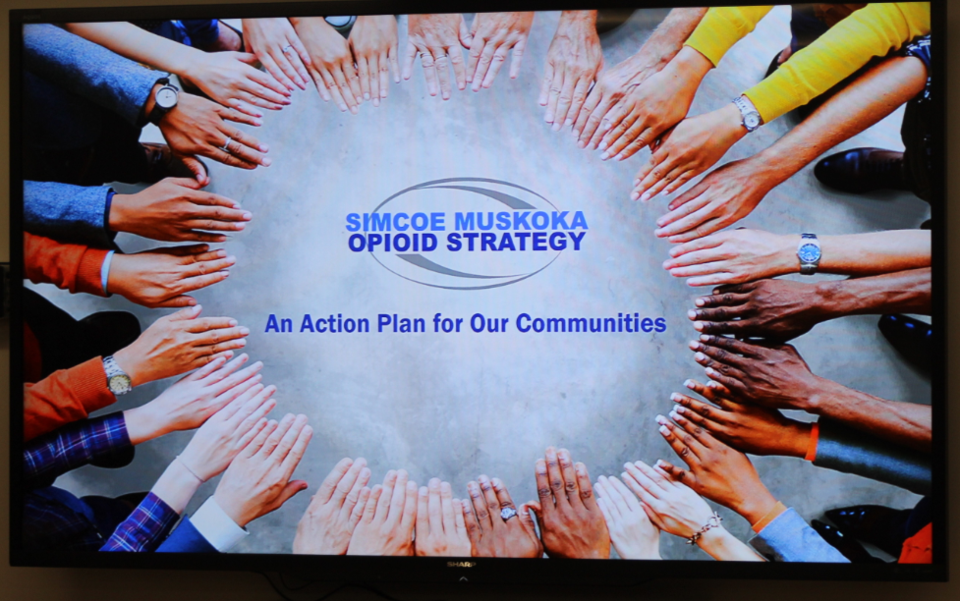Recently, the municipalities of Midland, Penetanguishene along with Tay and Tiny Townships issued proclamations that August 31 be recognized as International Overdose Awareness Day.
It was a topic that Midland Councillor Bill Gordon was eager to bring forward at last month’s regular meeting, speaking to council on the lack of attention overdose awareness receives in the public eye in comparison to the daily COVID-19 statistical updates.
“What we don’t see,” said Gordon, “is a daily update on how many people succumb from opioids and overdoses, and how many ‘sudden deaths’, as the police call them, occur in our neighbourhoods.
“And I think if we did, it’d feel a lot more like a pandemic when you look at the sheer number of Midland residents in the past year alone who are body bagged and buried because of overdoses, accidental or otherwise.”
The Simcoe Muskoka Opioid Strategy (SMOS) is a multi-sector collaboration between the County of Simcoe, the District Municipality of Muskoka, the North Simcoe Muskoka Local Health Integration Network (LHINS), and the Simcoe Muskoka District Health Unit (SMDHU). It was formed to address the opioid crisis in Simcoe and Muskoka.
Statistics provided from SMOS give a thorough overview of the opioid crisis through their site. Links to national statistics for opioid related deaths, provincial related opioid statistics, and regional statistics are available.
On the site, links to suspected drug overdose emergency department visits within Simcoe County and Muskoka District get updated weekly, while confirmed opioid overdose emergency department visits are updated monthly.
Twenty years ago, a conversation between an Australian needle and syringe program manager, Sally Finn, and a community and health development program coordinator, Peter Streker, sparked the global movement for Overdose Awareness Day. By the next year, Finn’s intent to turn drug overdose conversations into a non-threatening, information-based opportunity extended into an international movement.
In 2012, Australian charity Penington Institute took over, advancing Finn’s message of advocating against the negative stereotypes of drug-related fatalities.
Midland Mayor Stewart Strathearn admitted that the mechanisms weren’t available to light up municipal offices in purple, the colour attached to International Overdose Awareness Day, but offered that residents could take a moment to reflect on how to support the day, its cause, and those people in the community affected by overdoses.
“I’m asking people to pause on that day,” said Strathearn, “and if you have any input to helping your neighbours in terms of griefs that they have, or supports to your neighbours in the community, to think about how you might do that.”
While Gordon considered the gesture for Midland and all neighbouring municipalities to make the proclamations to be “a big deal”, he also expressed frustration at the ability for council to do anything more substantial than such representative gestures to the issue.
“As a lower-tier municipal government,” said Gordon, “we lack any formal mandate that could meaningfully impact this issue other than a supportive role to the health unit, our hospital, and the many services in our community that deal with addictions and the collateral damage to those who suffer from addictions.
“If nothing else, we need to raise awareness and help keep the issue in the forefront, much in the same way as we do for homelessness and lack of affordable housing – all areas we have limited to no formal jurisdiction or funding,” Gordon added.
The town of Penetanguishene wishes to remind the public that, as per the SMDHU, take-home Naloxone kits and training are available free of charge and without need of prescription for people at risk of overdose and their family and friends. Naloxone kits are available at the SMDHU, community health centres, and many pharmacies across the region. Health cards are not required. Individuals are encouraged to call their pharmacy ahead of time to ensure a Naloxone kit is available.
Additionally, the OPP is raising opioid public awareness with a focus on the Good Samaritan Drug Overdose Act (GSDOA), to encourage people to seek life-saving assistance. The GSDOA provides some legal protection for individuals who seek emergency help during an overdose, including the person experiencing an overdose.
Additional information can be found on the GSDOA page of the OPP website.
Information on symptoms and responding to an opioid overdose can be found on the SMDHU website or by calling Health Connection at 705-721-7520 or 1-877-721-7520 Monday to Friday from 8:30 a.m. to 4:30 p.m.
Further information can be found on the International Overdose Awareness Day website.


